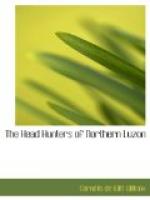orientation. Of course there must be some orographic
system; but to mark it, we should have had to fly
over the land. To us on the trail it was not
evident, mountain shouldering mountain, and valley
swallowing valley, in confusion. And wherever
possible, rice-terraces! If we posit the struggle
for existence, then in this view alone these Ifugaos,
and other highlanders as well, are a gallant people.
Not every hillside will grow rice; if the soil be
good, water will be lacking; or else, having water,
the soil is poor. But, wherever the two conditions
are combined, there will one find the slope terraced
to the top, and scientifically terraced, too, so that
every drop of water shall do its duty from top-side
to bottom-side. The labor of original construction,
always severe, in some cases must have been enormous,
as we shall see later. Many of these terraces
are hundreds of years old; their maintenance has required
and continues to require constant watchfulness.
Nearly every year the supply of rice runs short and
the people fall back on
camotes (sweet potatoes).
And yet, in marked contrast with their cousins of
the plains, whom these conditions would drive to helpless
despair, we heard on this trip not one word of complaint.
Not once did they put up a poor mouth and beg the
Government to come to their help. On the contrary,
they were cheerful throughout, knowing though they
did that before the year was over they would probably
all have to pull their gee-strings in a little tighter.
It is not too much, therefore, to say that these highlanders
are in a true sense a gallant people. Indeed,
they are the best people of the Archipelago, and with
any sort of chance they will prove it. This chance
our Government, thanks to Mr. Worcester’s initiative
and sustained interest, is giving them, the first and
only one they ever have had.
This digression brings us a little nearer to Banawe;
we leave the terraced hills behind us, after noting
how free of all plants the retaining-walls are kept,
the sole exception here and there being the dongola,
with its brilliant leaf of lustrous scarlet.
In time we began to descend, and finally there burst
on the view the sharpest valley yet, as though some
Almighty Power had split the mountains apart with
a titanic ax. Down one flank we went with Banawe
near the head, but farther off than we thought, because
the trail was now filled with men that had come out
to welcome us, all of whom insisted on shaking hands
with all the apos. Our last three miles
were a triumphal procession—columns, gansas,
bubud, spears, shouts, escorts, flags. Every
now and then a halt; a bamboo filled with bubud
would be handed up, and everybody had to take a pull.
Once I noticed Gallman in front hastily return the
bamboo, and reach desperately for his water-bottle;
the next man did the same thing. It was now my
turn, and I understood; I tipped up the tube, and thought
for the moment that I had filled my mouth with liquid
fire, so hot was the stuff! If there had ever
been any rice in the original composition, it had
completely lost its identity in the fearful excess
of pepper that characterized this particular vintage.
It was hours and hours before our throats forgave
us.




